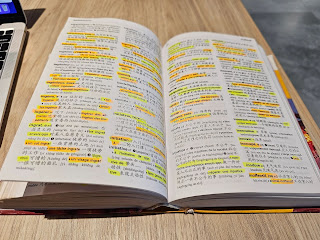Today is a public holiday in Singapore for Christmas. Since I woke up in the morning, I haven’t gone out yet, and have been browsing the Internet for no particular purposes. I really shouldn’t be wasting my time like this, so I’m thinking of heading out later to a neighborhood cafe to do some reading.
A few days ago, I celebrated the one-year anniversary of my learning project of the Larousse French-Chinese dictionary, with which I have been studying French vocabulary intensively. As of now, I have studied 450 pages out of the total of 765 pages, representing the completion rate of 58.82 percent.
I haven’t tracked the exact number of words I’ve learned, but assuming 20 words per page, it must be in the neighborhood of 9,000 words. If I go by proportion, I should be able to learn around 15,300 words by studying the entire dictionary, a very substantial figure.
This might sound like an ambitious endeavor, but I’ve done similar things in the past, where I studied an entire dictionary on two separate occasions in French alone. If I include English and Chinese, I’ve already studied several dictionaries in their entirety during the multiple decades of my language-learning journey.
In terms of developing my ability to understand a foreign language through reading and listening, intentional studying of vocabulary is an extremely powerful method. Previously, I used physical and digital flashcards to memorize words. However, nowadays, I try to commit them to memory by simply reading over the dictionary entries in a particular section several times.
The new method is surprisingly efficient, because I can save a substantial amount of time and effort by skipping the creation of flashcards, an extremely labor-intensive undertaking. However, the effectiveness of memorizing words with flashcards differs from one individual to another, so I won’t refute the utility of this method for every learner—if you find it useful and sustainable, by all means go for it.
Among the three major pillars that form the basis of proficiency in a foreign language—grammar, pronunciation, and vocabulary—vocabulary is the most challenging to learn, not because of the difficulty of individual words, but because of the sheer quantity of words you need to learn to achieve satisfactory comprehension of native content, such as books, movies, and television shows.
By some statistics, an average college-educated native English speaker is estimated to recognize and understand 20,000 to 35,000 English words. This estimate sounds about right based on my own experience of learning English, where I began to read English books comfortably with around 20,000 words in my vocabulary.
Assuming the same for French, I still have a long way to go before I can understand and enjoy novels and movies in this language, although I’m more than halfway through in my vocabulary acquisition. Since learning French is something I enjoy tremendously, I intend to keep on learning, at least until I finish studying the current dictionary. Hopefully, I can have a breakthrough in French comprehension in 2025!








